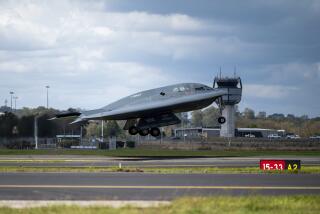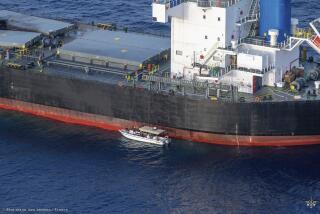Yemen’s Troubling Scuds
- Share via
It’s difficult to know why Yemen felt it needed Scud missiles. It has quarreled with its northern neighbor, Saudi Arabia, over the years, but last year the two countries seemed to have patched up their border dispute. Even if the missiles bought from North Korea make Yemen feel more secure, the country’s history as a haven for Al Qaeda members and launching pad for anti-Western violence raises fears that the weapons could fall into the hands of terrorists.
The terror connection is what set bells clanging upon the discovery of more than a dozen Scud missiles aboard a ship flying no nation’s flag in the Arabian Sea, apparently headed for impoverished Yemen. More alarming, the ship had sailed from North Korea, a longtime global arms seller that recently acknowledged having a nuclear weapons development program.
The United States apparently tracked the Scuds from the start; Spanish ships on anti-terror patrol in Middle Eastern waters stopped the freighter Tuesday and discovered the missiles hidden beneath a load of cement. Yemen’s official news agency said the president of Yemen called Vice President Dick Cheney and the weapons eventually were delivered. White House spokesman Ari Fleischer said there was no provision under international law to stop the missile delivery. Score one for unregulated international arms trade.
The single good outcome in this case is that it puts rogue states like North Korea on notice that the United States is at least closely tracking such weapon movements.
There is no evidence that Yemen itself provided arms to terrorists in the past, although the country is known as a transit point for weapons, money and soldiers of fortune. The main port, Aden, was the site of the October 2000 attack on the U.S. destroyer Cole that killed 17 U.S. sailors and nearly sank the warship. In a similar attack this year on a French tanker, a boatload of explosives was driven into the vessel’s side.
U.S. officials bitterly criticized Yemen for lack of cooperation in investigating the Cole bombing, but after Sept. 11, 2001, Yemen helped in the search for terrorists’ money and in seeking individuals. Last month, a missile fired from an unmanned CIA plane over Yemen killed six suspected Al Qaeda operatives, including one of the group’s most senior people. In addition, U.S. soldiers have trained Yemeni soldiers in counter-terrorism tactics.
Making the Scud deal more troublesome is what defense officials said was Yemen’s earlier promise to Washington that it would stop making such purchases from North Korea. The United States has heard enough broken promises; Yemen should realize it is better off being Washington’s partner in the fight against Al Qaeda than North Korea’s customer for weapons that could destabilize the region.
More to Read
Sign up for Essential California
The most important California stories and recommendations in your inbox every morning.
You may occasionally receive promotional content from the Los Angeles Times.












